Well, now, it’s no secret that betta fish are one of the most sought-after species in the world of aquariums. And why wouldn’t they be? Their striking hues and lively personalities make them a real treat for the eyes and soul. But listen up; just like any other pet, these little ones require a balanced diet to keep them healthy and thriving. So, here’s the million-dollar question: can betta fish eat bread ? Buckle up because this blog entry will deeply dive into the matter and determine whether it’s a wise choice.
Table of Contents
Importance of Proper Nutrition for Betta Fish

Proper nutrition is critical if you want your betta fish to be healthy and happy. These magnificent creatures have specific dietary needs that must be met to ensure they stay in tip-top shape. You see, a diet lacking essential nutrients can cause a myriad of health issues, including stunted growth, fin rot, and a host of other illnesses.
When it comes to feeding betta fish, protein is where it’s at. High-quality protein sources should be on the menu, like live or frozen brine shrimp, bloodworms, and pellet food explicitly designed for bettas. And remember the vitamins and minerals in veggies like spinach and zucchini – these are essential for a well-rounded diet.
But hold your horses, folks – here’s a crucial piece of information you must remember. Betta fish have teeny-tiny stomachs and can only chow down on small portions at a time. Overfeeding can result in obesity and other health concerns. So, provide them with a balanced diet in the right amounts, and you’ll be on your way to having one happy and healthy betta fish.
Nutritional Needs of Betta Fish
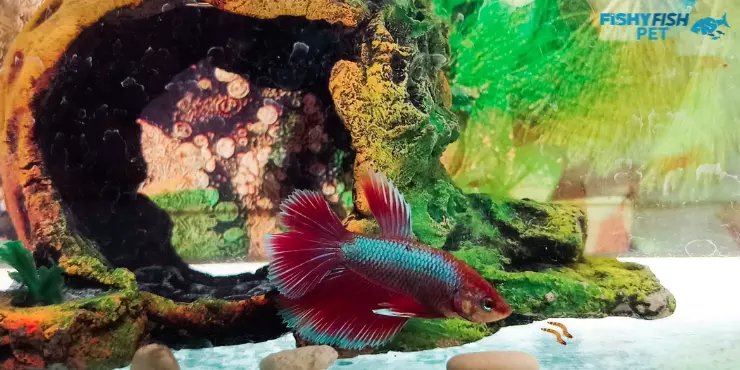
When keeping betta fish healthy, providing them with a diet high in protein is essential. These carnivorous creatures typically feast on small insects, larvae, and crustaceans in the wild. As a responsible betta fish owner, it’s crucial to replicate their natural diet as closely as possible by offering them a well-balanced meal.
Protein is a vital nutrient that contributes to the growth and repair of tissues in betta fish. Their diet should contain at least 40% protein, which can be sourced from various foods such as live or frozen brine shrimp, bloodworms, daphnia, or high-quality betta pellet food.
Aside from protein, betta fish also require other nutrients to stay healthy. Fats are necessary for energy and hormone production, while carbohydrates provide an additional energy source. Vitamins and minerals are crucial for maintaining healthy bodily functions and preventing diseases. By offering a diverse diet that contains all these essential nutrients, you can help ensure your betta fish thrive in captivity.
Potential Health Problems Resulting from a Lack of Proper Nutrition

To keep your betta fish in tip-top shape, ensure they get the proper nutrition. Neglecting this aspect can lead to many health problems nobody wants to deal with. Malnutrition is big, causing issues like stunted growth, lethargy, and a weakened immune system.
But that’s not all, oh no! Inadequate nutrition can also lead to fin rot, a bacterial infection that rots away those beautiful fins and tails. This is a challenging experience for your fishy friend.
And don’t even get me started on obesity! Overfeeding or giving your Betta a diet too high in fat can lead to severe health issues like diabetes and heart disease. Nobody wants that for their little buddy, so provide a well-balanced diet that meets all their nutritional needs. Trust me; keeping your betta fish healthy and happy is worth it.
Bread as Food for Betta Fish
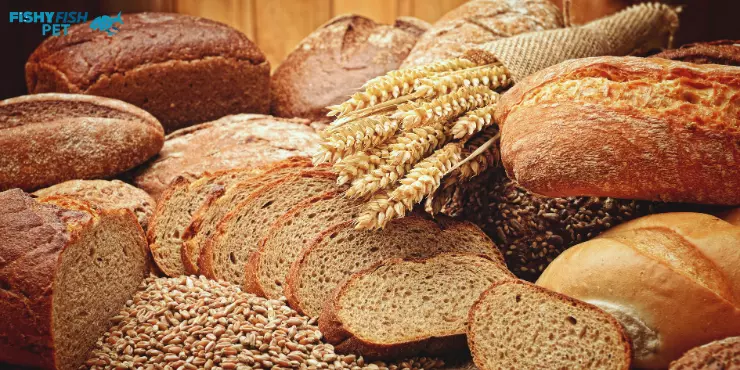
They need a balanced and just-right diet to keep Betta fish healthy and happy. You know the drill; it’s no secret that maintaining a balanced diet is key to their health and well-being.
Some of you may wonder, can we give our betta fish bread? It’s a fair question that many betta fish owners may have.
Overview of Bread as a Potential Food Source
Bread is an everyday staple in many households, and it may seem like an easy option to feed our betta fish. But hold up; we have to talk about this. It’s important to note that bread is not a natural food source for betta fish and may not provide them with the necessary nutrients to stay healthy.
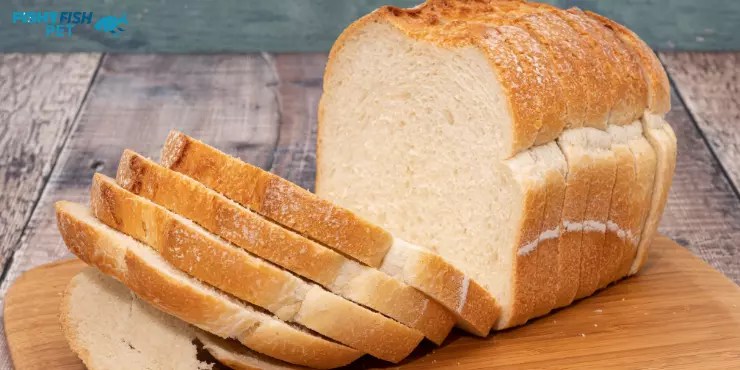
You see, betta fish require a diet that’s high in protein, with some carbs and fats. But bread, conversely, is primarily made of carbs, with just a little bit of protein and almost no fat. Sure, bread might give ’em a quick burst of energy, but it doesn’t provide the essential nutrients that betta fish require to stay healthy and happy. So, let’s keep the bread for ourselves and give our betta fish a specially formulated diet for their needs.
Nutritional Content of Bread
Bread is a delightful flour, water, yeast, and salt concoction. Of course, depending on the particular type of bread, some additional ingredients may be thrown into the mix, such as sugar, butter, and eggs. While it’s true that bread can offer some nutrients, the nutritional value can differ significantly depending on the bread.
Take white bread, for instance. It’s crafted from refined flour and stripped of many of its nutrients. This results in a product low in fiber, vitamins, and minerals. On the flip side, whole wheat bread is produced from whole grains and contains more of the aforementioned fiber, vitamins, and minerals. But, alas, even whole wheat bread may not meet the essential nutritional needs of betta fish.
Potential Benefits and Drawbacks of Feeding Bread to Betta Fish

There are some potential benefits to feeding bread to betta fish, as it can provide a source of carbohydrates and energy. However, it’s crucial to remember that betta fish require a diet rich in protein, which bread may not be able to offer them.
Now, let’s discuss the potential drawbacks of feeding bread to betta fish. You see, bread contains gluten, which may be troublesome for our aquatic friends to digest. This could result in uncomfortable bloating and other digestive issues, which we want to avoid.
Furthermore, feeding bread to betta fish can lead to obesity and other health problems. As bread is high in carbohydrates and low in protein and fat, it may cause weight gain and other health issues that could negatively impact the health of our beloved bettas.
It’s important to note that while bread may be a common household staple, there are better food sources for betta fish. To keep our bettas healthy and happy, it’s best to provide them with food options specifically designed to meet their dietary requirements. These options should contain high amounts of protein, carbohydrates, and fats to give them the essential nutrients they need to thrive. Let’s avoid feeding bread to betta fish, as it may cause potential digestive issues, obesity, and other health problems.
Potential Health Risks of Feeding Bread to Betta Fish
Betta fish require a balanced diet to maintain their health and well-being. While many food options are available for betta fish, some owners may be tempted to feed them bread. However, bread may not be the best food option for betta fish and can potentially lead to health risks. This blog post will explore the potential health risks of feeding bread to betta fish.
Risk of Digestive Issues

We must be cautious when feeding our beloved betta fish bread, as there are some potential health risks to consider. One of these risks is the potential for digestive issues, as bread contains gluten that can be difficult for betta fish to digest appropriately.
As a result, feeding bread to betta fish may cause bloating, constipation, and other digestive issues that can be uncomfortable for them to endure. In some instances, these issues may even develop into more severe health problems that could negatively impact the overall well-being of our aquatic friends.
Moreover, bread lacks the necessary fiber that betta fish require to maintain a healthy digestive system. Without adequate fiber in their diet, betta fish may encounter various digestive issues that could increase their susceptibility to disease and other health complications.
While bread may seem like a convenient option to feed our betta fish, we must be mindful of the potential health risks that come along with it. To ensure that our bettas remain healthy and happy, it’s best to stick to food options specifically designed to meet their dietary needs and provide them with the necessary nutrients for optimal health.
Risk of Malnutrition or Nutrient Deficiencies
There are better ways to go than bread. While it’s true that bread is mainly composed of carbohydrates, it falls short on the essential nutrients our betta buddies need to stay in tip-top shape. These little guys require a diet that is rich in protein, along with some carbs and fats.
Unfortunately, feeding them bread can lead to malnutrition or nutrient deficiencies, which can seriously affect their long-term health. And let’s not forget that bread lacks vital vitamins and minerals like vitamin C, vitamin D, calcium, and iron, all of which are critical for the growth and development of betta fish. So, let’s keep the bread for our consumption and make sure our bettas get the proper nutrition they deserve
Risk of Overfeeding or Weight Gain
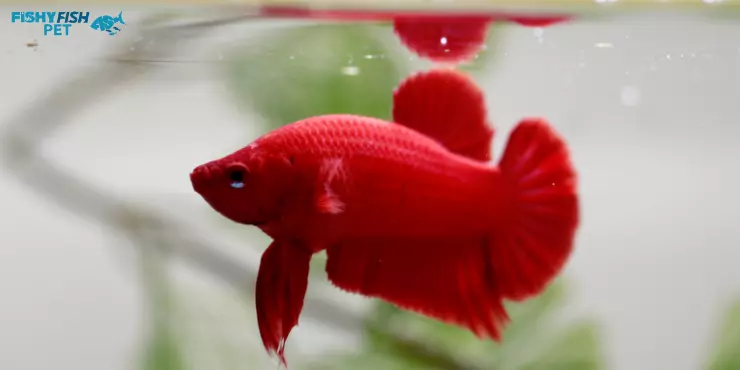
Feeding bread to betta fish is risky as it may lead to overfeeding or weight gain. This is because bread is high in carbohydrates and low in protein and fat, which can cause betta fish to become overweight or obese, leading to a range of health issues such as heart disease, liver disease, and diabetes.
Furthermore, overfeeding betta fish with bread can lead to bloating and other digestive problems. Given their small stomachs, feeding a betta fish small meals throughout the day is essential. Feeding them too much bread can cause overeating and various digestive complications.
Feeding bread to betta fish poses several health risks, including Malnutrition, weight gain, and digestive issues. While bread may provide some energy, it lacks the crucial nutrients that betta fish need for optimal health. Betta fish require a diet rich in protein, some carbohydrates and fats, and specialized food options that cater to these nutritional needs. Therefore, it’s crucial to provide betta fish with a balanced diet that meets their dietary needs and avoid feeding them bread.
Alternatives to Bread for Betta Fish
Providing your fish with a healthy and balanced diet is crucial to ensure their optimal health and well-being. The question arises, “Can betta fish eat bread and breadcrumbs?” The answer is no. While bread may seem convenient, it lacks the essential nutrients your betta fish needs to thrive.
Overview of Other Food Options

As a responsible betta fish owner, it’s essential to provide your fish with a well-rounded and balanced diet that meets their dietary needs. Fortunately, there are several food options available for betta fish, including:
Nutritional Benefits of Alternative Food Sources
Providing fish with a balanced and nutritious diet ensures their optimal health and well-being. While bread may seem tempting, alternative food sources offer a range of nutritional benefits that bread lacks.
Here are some of the nutritional benefits of alternative food sources that are essential for maintaining your betta fish’s health:
Examples of Healthy Betta Fish Diets
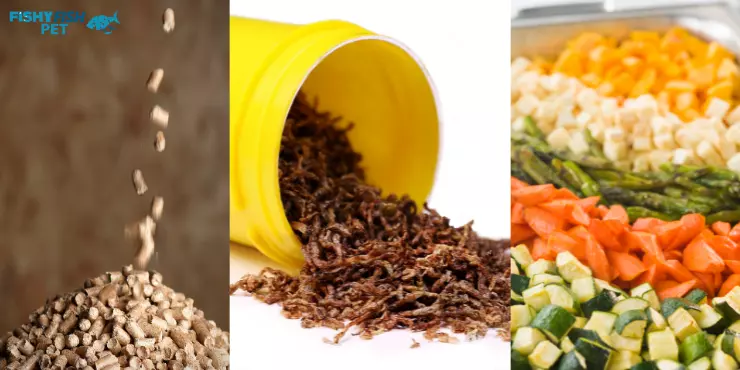
In order to maintain the health and well-being of your betta fish, it’s crucial to provide them with a balanced and nutritious diet. Here are some examples of healthy diets for betta fish:
Feeding your betta fish a balanced diet is critical for their health and longevity. Instead of offering bread lacking nutrients, choose alternatives like pellets, frozen or live foods, and vegetables. Providing your betta fish with a healthy and balanced diet can help them live long and healthy lives.
How to Incorporate Bread into a Betta Fish Diet Safely

Some experts advise against feeding bread to them because of possible health hazards. Nevertheless, if you wish to give your betta fish a taste of the good stuff, you must do it with care and prudence. So, stick around as we dive into how to include bread in a betta fish’s diet safely.
Tips for Feeding Bread in Moderation
While it’s true that bread is not the most ideal sustenance for our beloved betta fish, it can still be given to them in moderation. However, there are some essential things to remember when feeding your betta fish bread. Take a gander at these tips, won’t you?
Suggestions for Pairing Bread with Other Nutrient-Rich Foods
Bread is not a perfect diet option for our betta fish, it can be paired with other nutrient-rich foods to create a more balanced and varied diet. Here are some tips on how to pair bread with other foods for our beloved betta fish:
Recommendations for Monitoring Betta Fish Health While Incorporating Bread Into Their Diet

When adding bread to your betta fish’s diet, closely monitor their health. Here are some suggestions for monitoring your betta fish’s well-being:
Although bread should not be the primary source of nutrition for betta fish, it can be given to them in moderation when combined with other nutrient-dense foods. Remember to limit the amount of bread, cut it into small pieces, and remove any uneaten bread immediately.
While incorporating bread into your betta fish’s diet, it is important to closely monitor their health and be prepared to adjust their diet if necessary to prevent any digestive problems or weight gain. With these tips, you can confidently incorporate bread into your betta fish’s diet while keeping them healthy and happy.
Conclusion
The question of whether bread is a suitable food for betta fish is a complex one. While bread does have some nutritional value, it also presents potential health risks that cannot be ignored. Betta fish have specific dietary requirements that must be met to ensure their overall health and well-being. Failing to provide them with the proper nutrition can lead to various health issues.
Therefore, betta fish owners must be well-informed about their pets’ nutritional needs and make food choices accordingly. Numerous alternative food options can offer the necessary nutrients for betta fish, such as high-quality pellets, frozen or live foods, and fresh vegetables.
If an owner chooses to incorporate bread into their betta fish’s diet, they should do so in moderation and combine it with other nutrient-dense foods. Additionally, closely monitoring the fish’s health and adjusting their diet is crucial.
The decision to feed bread to betta fish must be made with great care and consideration for the fish’s health and well-being. With proper nutrition and care, betta fish can enjoy a long and healthy life, providing their owners joy and beauty.
FAQs
Can bettas eat bread crumbs?
Bread is a typical human food that some pet owners may consider feeding to their betta fish. However, it could be a more complex issue regarding whether betta fish can eat bread crumbs. Bread is generally unsuitable for betta fish since it lacks the essential nutrients they need to maintain optimal health and well-being.
Feeding bread to betta fish can result in various digestive issues, including constipation and bloating. Moreover, bread crumbs can contaminate the water in the betta fish’s tank, potentially harming their health. Therefore, it’s generally recommended that pet owners avoid feeding bread to their betta fish.
Instead, feeding a betta fish a well-balanced diet that meets its nutritional needs is best. This can include high-quality pellets, frozen or live foods, and fresh vegetables. These foods are specially formulated to provide betta fish with the essential nutrients they require to stay healthy and thrive.
Maintaining a varied and nutritious diet for betta fish is crucial to ensure their overall health and well-being. While it may be tempting to feed them human food like bread, it’s important to remember that not all foods are safe or suitable for betta fish.
Although betta fish can eat bread crumbs, it’s not recommended as it can cause digestive issues and harm their health. Instead, choose specially formulated betta fish foods to meet their nutritional needs. Pet owners can help ensure that their beloved pets live long and healthy lives by feeding a well-balanced diet to betta fish.
Can you feed betta fish bread?
Betta fish, with their vibrant colors and long, flowing fins, are beloved pets among many. However, pet owners may wonder if bread is suitable for feeding these fish. Although betta fish may show interest in bread, it is not a good choice for their diet as it lacks essential nutrients for their optimal health and well-being. Moreover, feeding bread to your betta fish can cause digestive problems, such as constipation and bloating.
To ensure that betta fish get the proper nutrition they need, it is recommended that pet owners feed them a well-balanced diet that meets their specific nutritional requirements. High-quality betta pellets, frozen or live foods, and fresh vegetables are among the best options. These foods are specially formulated to give Betta fish the essential nutrients they need to thrive in your aquarium.
While some fish may eat bread if offered, it is essential to understand that just because they enjoy it does not mean it suits them. Bread is not a natural part of a betta fish’s diet and can harm its health if fed regularly or in excess.
In summary, feeding betta fish with bread is not recommended as it lacks essential nutrients and can cause digestive issues. Instead, pet owners should opt for specially formulated betta fish food that meets their nutritional requirements. By feeding your betta fish a well-balanced diet, you can help ensure they have a long and healthy life in your aquarium.
What human food can a betta fish eat?
Betta fish’s diet should mainly consist of high-quality Betta fish food. While offering occasional treats is alright, you must ensure that any human food you give to your Betta fish is safe and has the right nutritional value.
Here are some human foods that your Betta fish can enjoy:
Brine Shrimp: This live food is packed with protein and highly nutritious for Betta fish.
Betta Flakes: Some Betta fish owners prefer to feed their pets flakes specially designed for Betta fish. These Betta flakes are made with high-quality ingredients and contain essential nutrients that Betta fish need.
Vegetables: Certain vegetables, such as spinach and peas, can benefit Betta fish in small quantities. To make them easier to eat, cook them and cut them into tiny pieces.
It’s essential to know that you should never feed bread to your Betta fish. Bread lacks the crucial nutrients that your fish require and can cause digestive problems. Additionally, your fish should not be fed any human food high in fat, sugar, or salt.
What are the reasons for not feeding bread to Betta fish?
When it comes to feeding your betta fish, it’s important to remember that they are carnivores that require a specific diet to stay healthy. While you may be tempted to feed them bread or fish flakes, they may need more than these options to give them the necessary nutrients to thrive.
Betta fish require a high-protein and high-fat diet, typically in specialized betta pellets or live foods like brine shrimp. Eating bread may not meet their dietary requirements, and it may cause digestive issues like bloating and constipation, leading to serious health problems. Moreover, overfeeding your betta fish can cause obesity and other health issues, so feeding them small, frequent meals is essential.
Additionally, bread can cause water quality problems in your betta fish tank. When the bread is not eaten, it can break down and cause excess waste, leading to poor water quality and potentially harmful conditions for your fish.
In summary, while bread may seem like a good option to feed your betta fish, it should be avoided as it can cause digestive problems, overfeeding, and water quality issues. Instead, stick to specialized betta pellets or live foods to provide your aquarium or tropical fish with a healthy and balanced diet.
At what point can Betta fish be fed bread? Is there a more suitable replacement?
Betta fish are carnivorous and require a specific diet to maintain their health and well-being. It’s important to note that bettas cannot digest bread properly, so it should not be fed to them at any point. Instead of bread, there are several alternative options for feeding betta fish.
High-quality betta pellets are a common choice and are designed to meet the nutritional requirements of bettas. Frozen or live foods such as brine shrimp and bloodworms can also be fed to bettas to supplement their pellet diet. Occasionally, fresh vegetables such as peas or spinach can be given as a treat.
As responsible betta fish owners, it’s essential to understand our pets’ nutritional needs and provide them with a varied and balanced diet. Overfeeding can lead to health problems, so it’s important to feed bettas in moderation and avoid feeding them human food or anything harmful.
In summary, feeding betta fish bread can harm them as they cannot digest it properly. Instead of bread, bettas should be fed a high-quality pellet diet supplemented with live or frozen foods and occasional fresh vegetables as a treat. Keep in mind that feeding them too much harmful food can be detrimental to their health, so it’s essential to feed bettas in moderation.
What are the reasons for not feeding bread?
Feeding bread to fish, including betta fish, should be avoided for several reasons. Firstly, bread contains gluten, which is not easily digested by fish and can lead to digestive problems. Secondly, bread is not a natural part of the diet of most fish species, including bettas. In the wild, bettas eat insect larvae and other small animals.
Feeding bread to your betta fish can also be harmful to their health. As carnivores, bettas require a diet high in protein, which bread does not provide. In addition, overfeeding your betta fish with bread can lead to obesity and other health problems. Many experienced betta owners recommend avoiding feeding any human food to your betta fish, as it can harm your Betta’s health and make them unsuitable for your aquarium.
If you want to feed your Betta fish something other than betta pellets, many more suitable options are available. Live or frozen brine shrimp is a good option as it is high protein and easily digestible. Another option is betta flakes, which are specially formulated to meet the nutritional needs of betta fish. It is essential to choose a diet suitable for your Betta and meets their dietary needs, rather than relying on human foods like bread.
What occurs when Betta fish consume bread?
Betta fish are popular with pet owners due to their vibrant colors and unique personalities. However, it is important to understand that betta fish have specific dietary needs and require a diet that is made for them. While bread may provide some nutritional value, it is not suitable for betta fish. Betta fish have difficulty digesting bread properly, which can lead to digestive problems and make your fish sick.
Feeding bread to betta fish can also lead to overfeeding and cause problems such as constipation, bloating, and swim bladder issues. It is essential to avoid feeding your betta bread and instead choose a diet specifically formulated for them, such as high-quality pellets for your betta fish. These pellets provide betta fish’s necessary nutrients to maintain their health and well-being.
Betta fish require a specific diet that is made for them, and there are better ways to feed your Betta than bread. It can cause problems for your betta fish and make them sick. Betta fish owners should give pellets to their betta fish as a suitable food option and avoid any food that can harm their fish. By understanding the dietary needs of your betta fish, you can ensure that they remain healthy and happy.
The reason why betta fish should not be fed bread.
Betta fish require a specific diet to stay healthy and thrive. While bread may seem like an easy food option, it’s important to avoid feeding it to your Betta for several reasons.
Firstly, bread is high in carbohydrates and lacks the nutrients that betta fish require. Betta fish are known to be carnivores, and their diet should consist of live or frozen foods, high-quality pellets, and fresh vegetables.
Secondly, feeding bread to your betta fish can cause digestive problems. Bread contains yeast, which can cause bloating and other digestive issues in betta fish. Additionally, bread can expand in the fish’s stomach, leading to blockages and other health problems.
Lastly, bread is not a good source of nutrition for betta fish and should not be relied upon as a staple food. Betta fish need a balanced diet to maintain their health and live long lives. As a responsible betta owner, it’s important to avoid feeding bread to your fish and instead provide them with suitable foods that meet their dietary requirements. In summary, while bread may be a convenient option, there are better choices for betta fish as it is high in carbohydrates, contains yeast, and can cause digestive problems.
Which types of fish can be fed with bread?
Feeding bread to fish, including betta fish, is generally not recommended as it is not a natural or nutritionally complete food source for them. Although some fish may occasionally eat bread if offered, it should only be given in small amounts as a rare treat rather than a regular part of their diet.
Cooked and processed bread is generally more accessible for fish to digest than raw bread, which can expand and cause blockages in their digestive system. While many fish, including betta fish, may like to eat bread, it is important to note that they need a protein-rich diet that includes live or frozen foods, high-quality pellets, and fresh vegetables to maintain their health and well-being.
Therefore, it’s best to stick to commercially available fish food options specifically formulated for your particular type of fish rather than relying on human food like bread to meet their nutritional needs.

Norman Dwemer
Senior Editor at FishyFishPet.com
Hello there! Norman here, an enthusiastic writer and avid supporter of FishyFishPet – the ultimate hub for fish enthusiasts of all levels. Our website offers invaluable insights into everything related to fish keeping, catering to beginners and seasoned aquarists alike. We cover a broad range of topics, from selecting the ideal fish species to designing the perfect tank environment. We’re delighted to have you visit us, and we’re confident you’ll find everything you need to enhance your fish-keeping journey. Thank you for choosing FishyFishPet!


